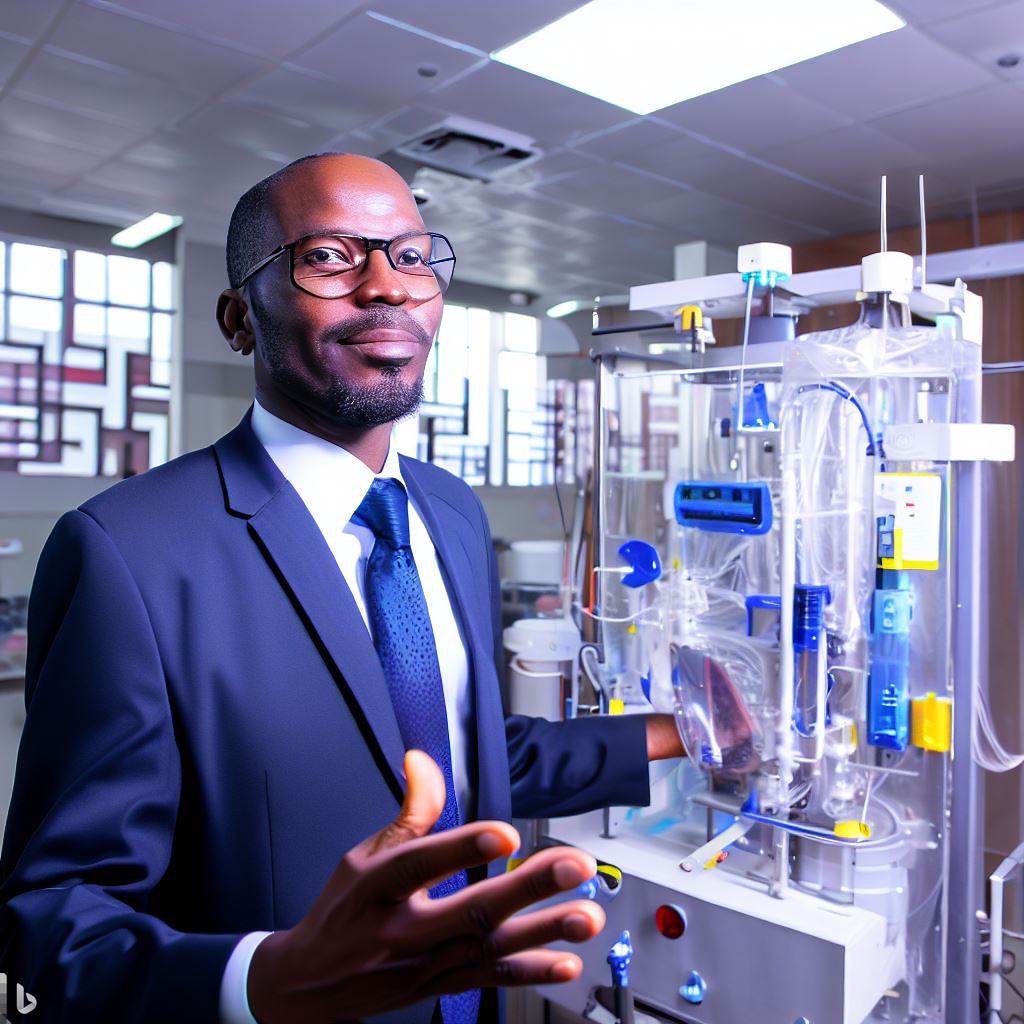Introduction
Ethics in Biomedical Engineering is a crucial topic that examines the moral principles and values related to this field.
Exploring this topic from a Nigerian perspective is significant because it considers the unique cultural, societal, and economic factors that influence ethical practices.
This blog post aims to shed light on the ethical considerations in Biomedical Engineering, particularly in Nigeria.
It will delve into various aspects such as the role of ethics in research, patient care, and technological advancements.
By examining the Nigerian perspective, we can gain insights into the challenges faced by biomedical engineers in this context and develop solutions that are culturally sensitive and sustainable.
Structure of the Blog Post
- Importance of Ethics in Biomedical Engineering: This section will discuss the fundamental reasons why ethical considerations are essential in this field and how they impact patient outcomes and trust.
- Ethical Challenges in Nigerian Biomedical Engineering: Here, we will explore the unique ethical challenges faced by biomedical engineers in Nigeria, considering factors like limited resources, cultural beliefs, and corruption.
- Ethical Considerations in Research: This section will focus on the ethical aspects related to research in Biomedical Engineering, such as informed consent, data privacy, and conflicts of interest.
- Ensuring Patient Care and Safety: We will discuss the ethical responsibilities of biomedical engineers towards patient care, including issues like medical device safety and access to healthcare in Nigeria.
- Ethical Implications of Technological Advancements: This section will explore the ethical dilemmas arising from rapid technological advancements in Biomedical Engineering, such as artificial intelligence and genetic engineering.
In fact, examining Ethics in Biomedical Engineering from a Nigerian perspective allows us to understand the challenges and develop ethical guidelines that are culturally appropriate and beneficial for the advancement of healthcare in Nigeria.
Understanding Biomedical Engineering
Biomedical engineering applies engineering principles to enhance healthcare.
This involves creating devices, instruments, and systems to better patients’ lives.
Collaborating with healthcare experts, biomedical engineers identify issues and drive advancements.
The field draws from biology, medicine, physics, chemistry, and engineering, allowing engineers to innovate in medical imaging, prosthetics, tissue engineering, and drug delivery.
Ethics in biomedical engineering is paramount. It guides responsible choices, vital for patient and public welfare.
It shapes technology design, development, and use, addressing patient safety, privacy, consent, and resource fairness.
Engineers prioritize patient safety by assessing risks, testing prototypes, and refining safety protocols.
Informed consent involves working closely with healthcare professionals to ensure patients understand treatment implications.
Privacy protection is essential, balancing data sharing and patient confidentiality.
Fair healthcare resource distribution is another ethical concern, urging accessible and affordable technologies.
Adhering to codes of conduct and collaborating with ethicists fosters a strong ethical culture.
In short, biomedical engineering blends engineering and healthcare, with ethics as its cornerstone, ensuring both medical progress and ethical integrity.
Ethics in Biomedical Engineering
Explain the concept of ethics and its importance in the field.
Ethics is the study of moral principles and values that govern human behavior.
In the field of biomedical engineering, ethics play a crucial role in ensuring the responsible development and use of medical technologies.
It establishes guidelines for professionals to promote fairness, transparency, and accountability in their work.
Discuss the ethical issues commonly faced by biomedical engineers
Informed consent and patient autonomy
Biomedical engineers often work with patients and human subjects.
Ensuring their informed consent is crucial to respect their autonomy and safeguard their well-being.
Engineers must obtain voluntary and knowledgeable consent before conducting any medical procedures or research studies.
Confidentiality and privacy concerns
Biomedical engineers frequently deal with personal medical information, which must be kept confidential and private.
They have the responsibility to protect patient data from unauthorized access and use, adhering to regulations and ethical guidelines.
Conflict of interest and professional integrity
Biomedical engineers may face situations where personal or financial interests conflict with professional obligations.
It is essential to prioritize the best interests of patients and the public, avoiding biases or compromising the integrity of their work.
Social justice and equitable healthcare access
Biomedical engineers are often involved in designing and developing medical technologies and treatments.
They must consider the social implications of their work and strive for equal access to healthcare resources, ensuring fairness and promoting social justice.
Ethics in biomedical engineering is of utmost importance to ensure the responsible practice of the field.
Biomedical engineers face various ethical issues, including obtaining informed consent, maintaining confidentiality, avoiding conflicts of interest, and promoting equitable healthcare access.
By upholding ethical principles, biomedical engineers contribute to the welfare of society and uphold professional integrity.
Read: Diversity in Biomedical Engineering: Nigeria’s Perspective

Ethics Education and Awareness in Nigeria
Biomedical engineering is a crucial field that combines the principles of engineering and medicine to improve healthcare outcomes.
However, it is essential to uphold ethical standards to ensure the safety and well-being of patients.
In Nigeria, ethics education and awareness in biomedical engineering are of utmost importance to maintain high professional standards and the credibility of the field.
Evaluating the Current State of Ethics Education
The current state of ethics education in biomedical engineering in Nigeria deserves careful evaluation.
While there are efforts to incorporate ethics into the curriculum, it is not given the same emphasis as technical skills.
Furthermore, the availability of qualified faculty to teach ethics remains a challenge.
The limited number of experts in biomedical ethics hampers the development of comprehensive ethics education programs.
Moreover, the lack of standardized guidelines for ethics education makes it difficult for institutions to ensure consistency in teaching ethical principles to budding biomedical engineers.
Read: Universities Offering Robotics Engineering in Nigeria
Challenges Faced in Promoting Ethics Awareness
Promoting ethics awareness among practitioners in the field of biomedical engineering in Nigeria presents several challenges.
Firstly, there is a general lack of awareness among professionals regarding the importance of ethics in their day-to-day work. This can be attributed to a lack of emphasis on ethics during their formal education.
Secondly, the absence of a professional regulatory body specifically dedicated to biomedical engineering makes it challenging to enforce ethical guidelines.
Without a governing body, practitioners may not feel compelled to update their knowledge and adhere to ethical practices.
Lastly, the scarcity of continuous professional development opportunities focused on ethics limits professionals’ ability to stay updated with emerging ethical issues in biomedical engineering.
Highlighting Initiatives and Programs
Despite the challenges, there are promising initiatives and programs addressing ethics education in biomedical engineering in Nigeria.
Some universities have started integrating ethics courses into their biomedical engineering curricula. This step aims to sensitize students to ethical dilemmas they may encounter in their future careers.
Additionally, professional associations have organized workshops and seminars to raise awareness about ethical principles among practicing biomedical engineers.
These events foster discussions on ethical considerations and encourage practitioners to apply ethical practices in their work.
Identifying Areas for Improvement
While progress has been made, there are several areas that require improvement in ethics education and awareness in biomedical engineering in Nigeria.
Firstly, it is crucial to develop standardized guidelines for ethics education in biomedical engineering.
These guidelines should outline the core ethical principles that professionals must abide by to uphold the integrity of the field.
Secondly, efforts should be made to establish a regulatory body specific to biomedical engineering.
This body would be responsible for enforcing ethical standards, providing guidance, and ensuring continuous professional development opportunities.
Furthermore, collaborations between academia, professional associations, and regulatory bodies should be strengthened.
Such collaborations can facilitate the design and implementation of comprehensive ethics education programs and foster a culture of ethical awareness among professionals.
Ethics education and awareness in biomedical engineering in Nigeria are essential to ensure the field’s growth and uphold the trust of patients and the public.
Evaluating the current state, recognizing challenges, promoting initiatives, and identifying areas for improvement will contribute to a stronger ethical foundation in the field.
Ultimately, the development of well-rounded biomedical engineers who prioritize ethics will lead to improved healthcare services for all Nigerians.
Read: Biomedical Engineering: Building a Sustainable Future in Nigeria
Addressing Ethical Dilemmas in Nigerian Biomedical Engineering
Navigating intricate ethical challenges is inherent to the realm of biomedical engineering, demanding judicious discernment.
This blog segment focuses on the Nigerian perspective, illuminating the ethical predicaments confronting professionals.
Nigerian biomedical engineers grapple with diverse moral quandaries.
Notably, the tension between patient autonomy and paternalism arises, obliging engineers to harmonize patient choice with their welfare. Compounded by familial influence, this dynamic gains complexity.
Resource allocation constitutes another ethical quagmire. Scarce resources prompt agonizing decisions about medical equipment distribution.
Deciding between allocating life-saving devices to a young child or an elderly patient with limited life expectancy typifies this challenge.
Acknowledging Nigeria’s cultural, social, and economic fabric is vital. Poverty, subpar infrastructure, and inadequate healthcare access frame ethical judgments.
Religious and traditional beliefs further shape approaches to these dilemmas.
Addressing these quandaries mandates a multifaceted approach.
Equipping engineers through education and awareness, formulating tailored ethical guidelines, and fostering collaboration among stakeholders – engineers, healthcare providers, policymakers, and advocacy groups – are key.
Adopting established ethical frameworks, like the four principles of medical ethics, ensures decisions are universally principled.
Regulatory bodies and professional organizations play a pivotal role by enforcing standards and facilitating continuous professional growth.
In summary, upholding ethical standards in Nigerian biomedical engineering warrants a holistic strategy.
By dissecting cases, probing ethical dimensions, proposing solutions, and embracing ethical frameworks, professionals uphold integrity while navigating challenges.
Read: Professional Bodies for Biomedical Engineers in Nigeria
Conclusion
This blog post has highlighted the importance of ethical considerations in biomedical engineering in Nigeria.
Throughout the blog post, we have seen how ethics play a crucial role in ensuring the well-being of patients and maintaining professional integrity.
Ethical considerations such as informed consent, confidentiality, and fairness are essential in biomedical engineering, as they directly impact patient care and trust.
It is imperative for professionals in this field to prioritize these ethical considerations in their work to deliver quality healthcare services.
There is a need for increased ethics awareness and education among biomedical engineers in Nigeria.
By promoting ethical values and principles, we can foster a culture of integrity and professionalism in the field.
This can help in building a strong foundation for ethical decision-making and practices.
Looking towards the future, there is hope for the advancement of ethics in Nigerian biomedical engineering.
With the integration of ethical education and training programs, professionals will be better equipped to navigate complex ethical dilemmas that may arise in their work.
Publish Your Professional Profile, Business or Brand
Showcase your expertise, gain trust, and boost visibility instantly on Professions.ng.
Publish NowThis will ultimately lead to improved patient care and overall societal well-being.
Ethics should be at the forefront of every biomedical engineer’s mind in Nigeria.
By prioritizing ethical considerations, we can ensure that the profession continues to evolve and make a positive impact on healthcare in the country.
The future of biomedical engineering in Nigeria looks promising as we work towards a more ethically conscious and responsible field.




